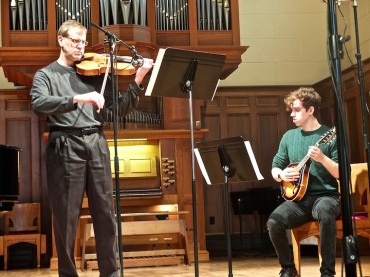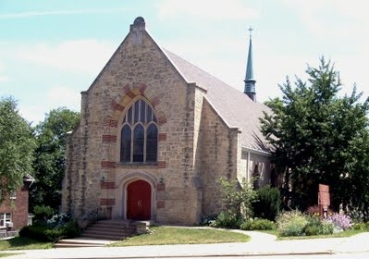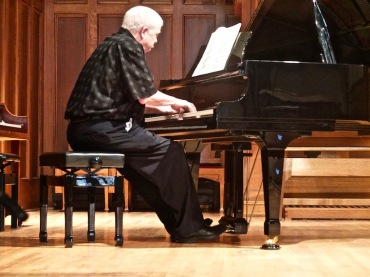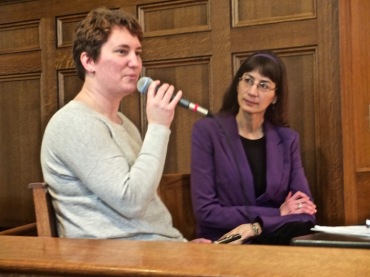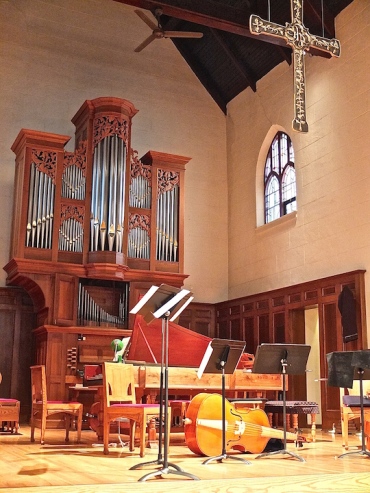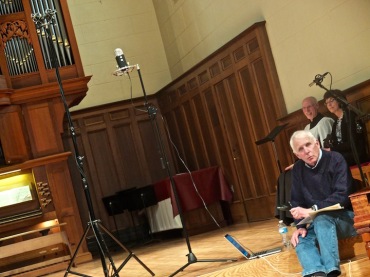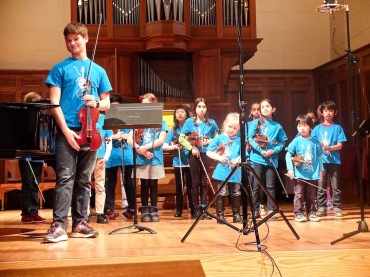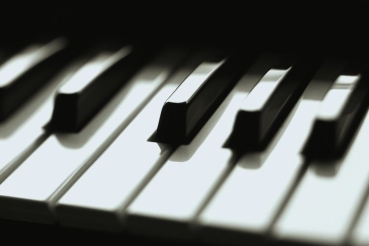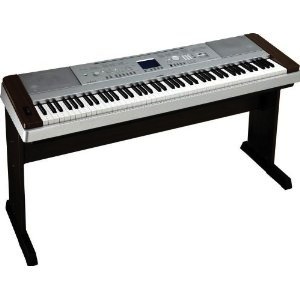The Well-Tempered Ear
This Sunday at 4 p.m., the Salon Piano Series debuts an online recital by pianist Kangwoo Jin. He plays music by Scarlatti, Beethoven, Liszt and Schumann. It is up until May 9
Leave a Comment
PLEASE HELP THE EAR. IF YOU LIKE A CERTAIN BLOG POST, SPREAD THE WORD. FORWARD A LINK TO IT OR, SHARE IT or TAG IT (not just “Like” it) ON FACEBOOK. Performers can use the extra exposure to draw potential audience members to an event. And you might even attract new readers and subscribers to the blog.
By Jacob Stockinger
This Sunday afternoon at 4 p.m. CDT, the Salon Piano Series, hosted by Farley’s House of Pianos, will debut an online concert by pianist Kangwoo Jin (below, in a photo by Andy Manis).
The concert, which was recorded at Luther Memorial Church, costs $10 and will be available online through May 9.
The program is:
Scarlatti – Sonatas in D minor and D Major, K. 213 and 214 (ca. 1756-1757)
Beethoven – Sonata in C-sharp minor, Op. 27, No. 2, “Moonlight” (1801)
Liszt – Transcriptions for solo piano of the songs “Widmung” (Dedication) by Robert Schumann and “Litanei” (Litany) by Franz Schubert
Schumann – Symphonic Etudes, Op.13 (1830)
Bishop – Home, Sweet Home
Tickets are only available online at eventbrite.com. Service fees apply. Complete program and concert information is at salonpianoseries.org
PROGRAM NOTES
Jin has written the following program notes for The Ear:
“As a musician, I am always eager to share music with the public. I am very excited to be able to reach out to the audience with this unprecedented Salon Piano Series Virtual Concert.
“I believe music soothes our mental health in difficult times regardless of age, gender or race. I very much hope my performance will contribute to this collective healing we feel through music.
“I wanted to include three different styles, as I usually do for recitals. This time I have Baroque, Classical and Romantic music.
“I chose one of the most famous Beethoven sonatas in order to celebrate his 250th birth year (2020), which I did not have a chance to mark last year.
“This piece is popular with the title of “Moonlight,” which Beethoven (below) never intended. Five years after his death, the German critic Ludwig Rellstab used the word “Moonlight” in order to describe the first movement. But it was really inspired by the funeral march in Mozart’s opera “Don Giovanni.” I try to bring out the tragic color of the first movement. (You can hear Jin play the exciting final movement of the sonata in the YouTube video at the bottom.)
“I also wanted to play the virtuosic masterpiece “Symphonic Etudes,” Op. 13, by Robert Schumann (below), including the beautiful posthumous variations 4 and 5.
I find this piece special in the sense that Schumann intended to make this piece “symphonic.” He created multiple layers of voices in various ways through each etude and created orchestral sounds. This polyphonic writing with multiple layers and a thick texture is what makes this piece difficult to play.
“I also specifically wanted to include one of the piano transcriptions by Franz Liszt (below) of Schubert’s Litanei auf das Fest Aller Seelen (Litany for the Feast of All Souls), D. 343.
“Schubert (below) used the poem “Litany” by Johann Jacobi (1740-1814). It is written for comforting the deceased. Robert Capell, the author of the book “Schubert’s Songs” (1929), said about this lied: There was never a truer or more touching expression of simple devotion and consoled grief … “The music rises from a pure well of affection and humility.”
“I would like to dedicate this piece to all the people who suffered from Covid 19.”
BACKGROUND
Here is a link to Kangwoo Jin’s impressive website where you can see many photos, learn about his extensive career as a teacher and hear many samples of his playing: https://www.pianistkangwoojin.com
Praised for his “refined tone quality with powerful energy” (Chosun Daily Newspaper), Jin (below, in a photo by Steve Apps for the Wisconsin State Journal) concertizes nationally and internationally, including performances in Germany, Italy, China, Indonesia and South Korea.
He gave his debut concert at the Sejong Arts Center in Seoul, South Korea, sponsored by the Chosun Daily Newspaper. He has given live performances on Wisconsin Public Radio and WORT 89.9 FM.
Jin appears frequently as a guest artist at music festivals, universities and various concert series. Recent invitations include UW-River Falls, Texas A&M University-Corpus Christi, and Tongji University in Shanghai. Kawai Pianos USA has also invited him as a guest artist at the annual Piano Technicians Guild Convention and Technical Institute in Florida.
Jin completed the Bachelor of Music degree at Hanyang University in South Korea, then earned his Performer Diploma and Master’s of Music at Indiana University, where he worked as an associate instructor.
He is the recipient of the J. Battista Scholarship for performance excellence at Indiana University and received the Collins Distinguished Fellowship for his doctoral studies, completed last year, at the University of Wisconsin-Madison, where he studied piano with Christopher Taylor and piano pedagogy with Jessica Johnson.
Tags: #AmericanPlayersTheatre, #ArtsCenter, #ArtSong, #BachelorofMusic, #BaroqueEra, #BaroqueMusic, #BeethovenYear, #BeijingChina, #BlogPost, #BlogPosting, #ChosunDailyNewspaper, #ChristianChurch, #ChristopherTaylor, #Classicalera, #ClassicalMusician, #CoronavirusPandemic, #CorpusChristi, #COVID-19, #DifficultTime, #DoctoralStudies, #DomenicoScarlatti, #DonGiovanni, #FacebookPost, #FacebookPosting, #Farley'sHouseofPianos, #FeastofAllSouls, #FranzLiszt, #FranzSchubert, #FuneralMarch, #GuestArtist, #HanyangUniversity, #HomeWebsite, #IndianaUniversity, #JacobStockinger, #JohannJacobi, #KangwooJin, #KawaiPianos, #LivePerformance, #LudwigVanBeethoven, #LutherMemorialChurch, #MajorKey, #MeadWitterSchoolofMusic, #MentalHealth, #MinorKey, #MoonlightSonata, #MusicCritic, #Musicfaculty, #MusicProfessor, #OnlineConcert, #OperaMusic, #PerformerDiploma, #PianoTechnician, #PolyphonicMusic, #ProgramNotes, #RobertSchumann, #RomanticEra, #RomanticMusic, #SalonPIanoSeries, #SchubertLieder, #SeoulSouthKorea, #ServiceFee, #ShanghaiChina, #SouthKorea, #SouthKorean, #SteveApps, #Sundayafternoon, #SymphonicEtudes, #TexasA&M, #TheEar, #TheUW, #Tongjiniversity, #UniversityofWisconsin-Madison, #UW-RiverFalls, #VirtualConcert, #VocalMusic, #WisconsinPublicRadio, #WisconsinStateJournal, #WolfgangAmadeusMozart, #YouTubevideo, affection, afternoon, age, April, art song, Arts, arts center, audience, auhtor, available, Bachelor of Music, Baroque, Baroque music, beautiful, Beethoven, Beethoven Year, birth, Bishop, blog, Blog post, blog posting, Book, China, Chosun Daily Newspaper, Christian, Christian church, Christopher Taylor, church, Classical, Classical era, Classical music, classicalmusic, collective, Collins, color, comfort, complete, composer, Concert, concertize, console, contribute, convention, coronavirus, coronavirus pandemic, Corpus Christi, cost, create, dead, death, deceased, dedicate, dedication, degree, different, difficult, difficult time, diploma, doctoral studies, doctorate, Domenico Scarlatti, Don Giovanni, Early music, energy, era, etude, excited, exciting, expression, Facebook, Facebook post, Facebook posting, Farley's House of Pianos, feast, Feast of All Souls, fee, festival, final, Florida, forward, Franz Liszt, Franz Schubert, funeral march, gender, German, Germany, grief, guest artist, guild, Hanyang University, healing, hear, Home, home website, hope, host, humiity, imformation, impressive, Indiana University, Indonesia, instructor, intend, internationally, Italy, Jacob Stockinger, Johann Jacobi, Johann Sebastian Bach, Kangwoo Jin, Kawai, Kawai PIanos, Korea, layer, layers, lied, like, link, link'share, Liszt, litany, live performance, Ludwig van Beethoven, Luther, Luther Memorial Church, Madison, major key, masterpiece, May, Mead Witter School of Music, Mental health, minor key, Moonlight Sonata, movement, Mozart, multipile, multiple, Music, music critic, music faculty, music professor, Musician, nationally, Newspaper, online, opera, Orchestra, orchestral, pandemic, People, Performer Diploma, photo, photos, Pianist, Piano, piano technician, piece, play, playing, poem, Poetry, polyphonic, polyphony, popular, post, posthumous, posting, powerful, professor, program, program notes, Protestant, public, race, Radio, reach, recital, Robert Schumann, Romantic, Romantic music, Salon Piano Series, sample, Scarlatti, scholarship, Schubert, sense, Seoul, service, service fee, Shanghai, share, simple, Singing, Sonata, song, soothe, soul, Sound, South Korea, special, sponsor, Steve Apps, study, style, suffer, Sunday, Sweet Home, SweetHome, Symphonic Etudes, symphony, tag, Teacher, teaching, Texas A&M, texture, The Ear, theme and variations, thick, ticket, times, tone, Tongji University, touching, tragedy, Tragic, transcription, true, United States, universities, university, University of Wisconsin-Madison School of Music, University of Wisconsin–Madison, unprecedented, USA, UW, UW-Madison, UW-River Falls, variation, virtual, virtuosic, vocal music, voice, Website, Wisconsin, wisconsin public radio, Wisconsin State Journal, Wolfgang Amadeus Mozart, WORT, WORT-FM 89.9, WPR, write, YouTube
Today – Monday, March 29 – is World Piano Day. Here are links to free online recitals. What does the piano mean to you? Did it play a role during the pandemic?
Leave a Comment
PLEASE HELP THE EAR. IF YOU LIKE A CERTAIN BLOG POST, SPREAD THE WORD. FORWARD A LINK TO IT OR, SHARE IT or TAG IT (not just “Like” it) ON FACEBOOK. Performers can use the extra exposure to draw potential audience members to an event. And you might even attract new readers and subscribers to the blog.
By Jacob Stockinger
Today – March 29, 2021 – is World Piano Day.
That is because today is the 88th day of 2021.
Gotta have some kind of code or symbolic meaning, after all.
In any case, there are virtual online celebrations all over the world. Here is a link to the official welcoming website that also lists Spotify and SoundCloud playlists from past years and dozens of worldwide events this year, running from March 25-30: https://www.pianoday.org
You can also find more on Google, Facebook, Instagram and Twitter.
The piano means a lot to The Ear, who listens to it and plays it. He loves, loves, loves the piano.
What has the piano and piano music meant to you in your life?
What role did the piano play for you during the past pandemic year?
Have you listened to or discovered newer, younger talent?
Do you have favorite pianists, either historic or current? What do you like about them?
Or maybe you have favorite piano pieces?
Please tell us all about you and the piano in the Comment section.
The Ear wants to hear.
In the meantime you can listen to the World Piano Day “monster recital” by 17 pianists who record for Deutsche Grammophon. The “Yellow Label” – the first commercial record label — has signed a lot of great pianists in its time, and still does.
Here is a link to the YouTube DG recital, which lasts 2 hours and 50 minutes. If you go to the actual YouTube site, click on Show More to see the complete list of performers and pieces. Otherwise performers and programs are displayed on the screen:
Tags: #AliceSaraOtt, #ArthurRubinstein, #BlogPost, #BlogPosting, #ChickCorrea, #CoronavirusPandemic, #COVID-19, #DaniilTrifonov, #DeutscheGrammophon, #FacebookPost, #FacebookPosting, #FredericChopin, #HomeWebsite, #InternationalDoubleReedSociety, #JacobStockinger, #JanLisiecki, #JohannSebastianBach, #JohannStrauss, #LangLang, #LudwigVanBeethoven, #MariaJoaoPires, #OnlineConcert, #PhilipGlass, #PianoMusic, #PIanoRecital, #RecordedMusic, #RecordLabel, #RichardStrauss, #RudolfBuchbinder, #Seong-JinCho, #SergeiRachmaninoff, #SergeiRachmaninov, #SviatoslavRichter, #SymbolicMeaning, #TheEar, #VirtualConcert, #VladimirHorowitz, #WolfgangAmadeusMozart, #WorldPianoDay, #YannickNezet-Seguin, #YellowLabel, #YouTubeChannel, #YouTubevideo, 2021, Alice Sara Ott, Arthur Rubinstein, Arts, Asia, asian, audience, Bach, Baldwin, Baroque, Beethoven, blog, Blog post, blog posting, celebration, Chick Correa, Chopin, Classical music, coe, commercial, composer, computer, Concert, coronavirus, Correa, current, Daniil Trifonov, Deutsche Grammophon, DG, discover, display, Early music, Europe, European, event, Facebook, Facebook post, Facebook posting, favorite, first, forward, Frédéric Chopin, Google, great, hear, historic, home website, Horowitz, Instagram, international, Jacob Stockinger, Jan Lisiecki, Johann Sebastian Bach, Johann Strauss, Kawai, key, Lang Lang, life, like, link, listen, local, Love, Ludwig van Beethoven, Madison, march, Maria Joao Pires, mean, meaning, Mozart, Music, national, new, online, pandemic, performer, Philip Glass, Pianist, Piano, piano music, piano recital, piece, play, post, posting, Rachmaninoff, Rachmaninov, recital, Record label, recorded music, regional, Richard Strauss, Richter, role, Rudolf Buchbinder, screen, Seong-Jin Cho, Sergei Rachmaninoff, Sergei Rachmaninov, share, sign, Sonata, SoundCloud, Spotify, Steinway, Strauss, Sviatoslav Richter, symbolic, symbolic meaning, tag, talent, tell, The Ear, time, today, Trifonov, Twitter, United States, video, virtual, Vladimir Horowitz, Website, welcome, Wisconsin, Wolfgang Amadeus Mozart, world, World Piano Day, Yamaha, Yannick Nézet-Séguin, year, Yellow Label, you, your, YouTube
Classical music: After this year’s success, “Bach Around the Clock” will return next year on March 10, 2018
10 Comments
By Jacob Stockinger
The revival of “Bach Around the Clock” (below) this past Saturday proved so successful to listeners, performers and organizers that it will return again next year in March 2018. (Below are violist Stan Weldy and his mandolinist son Alex.)
“It went so well, we will do it again,” said the chief organizer, violist Marika Fisher Hoyt (below), who plays with the Madison Symphony Orchestra, the Wisconsin Chamber Orchestra and the Ancora String Quartet. She not only was the main host for BATC, she also played in more than half-dozen performances.
As you may recall, the marathon event to mark the 332nd birthday of Johann Sebastian Bach (1685-1750) took place from noon to midnight, wisely revised to 9:30 p.m. after too few performers signed up, at St. Andrew’s Episcopal Church (below), 1833 Regent Street.
Plans for next year are already being made and meetings have already been held. And next year will bring major some changes, Fischer Hoyt told The Ear.
For one, the date will be March 10, 2018 – not March 17 or March 24 – which means it will come well before the usual timing of the Saturday nearest to Bach’s birthday of March 21. But, unlike what happened this year, this earlier date avoids the UW-Madison spring break plus the Easter break for public schools. That could reap big benefits in terms of audience and performers.
Because of the immense amount of work involved, Fischer Hoyt said, a non-profit organization will also be formed and more volunteers will be recruited to help spread out the workload of lining up performers and donors, and of organizing and hosting the event.
As for lining up performers, Fischer Hoyt is extremely optimistic.
“There’s a lot of talent in this town I’ve never heard of,” she told The Ear. (Below is impressive pianist Tim Adrianson performing three Preludes and Fugues from “The Well-Tempered Clavier,” Book II.)
The Ear, who spent an enjoyable six hours or so attending the event, has to agree. He took a lot of photos and will be posting more about the event in the coming days.
Right now, he wants to give a big shout-out to Fischer Hoyt for some of the innovations she brought to this year’s revival of a traditional event that was held for three years, and then abandoned, by Wisconsin Public Radio.
Here are a few of the changes she made, which The Ear thinks proved all for the better, for BATC 4.
1) There were multiple hosts, which breaks up the event and helps avoid monotony.
2) Prior to playing, performers, some of whom traveled from as far away as Dubuque, Milwaukee, Chicago and Waupun, were briefly interviewed and asked what they liked about Bach’s music and why they chose a particular piece to perform. (Below, flutist Casey Oelkers, left, talks with Hoyt.) That adds personal interest.
3) Free quality snacks of fresh fruit and cheese, not just delicious sweet things like cookies and kringle, were available, as were bottled water, tea and coffee. Good food translates into longer and more comfortable attendance.
4) The church’s venue, especially its woody interior (below), seemed much more suited to Bach’s music and friendly to the audience than the Pres House. And thanks to donations, in addition to a fine church organ there were fine instruments to play, including a Kawai grand piano and a hand-built clavichord from Farley’s House of Pianos. There were also birthday cakes donated by Clasen’s European Bakery of Middleton.
5) The entire event was recorded by Rich Samuels (below) — Madison’s chronicler of live music. He is from WORT-FM 89.9 and he will air BATC in increments on his “Anything Goes” program on Thursday mornings. In fact the broadcasts started this past week with a performance of the Brandenburg Concerto No. 3 on Thursday morning.
6) The event was streamed live via four different places or portals: the St. Andrew’s website, the Bach Around the Clock website, the Audio for the Arts website and WORT website.
7) There was an impressive variety of performers on all levels and of repertoire. It ranged from student to amateur to professional; from solo and small chamber groups to larger choral and orchestral ensembles, plus faculty members from the UW-Madison, UW-Whitewater and UW-Oshkosh as well as the Milwaukee Conservatory of Music. The Ear expects the lineup will get even better as word of next year gets out and spreads. (Below are students from the Suzuki Strings of Madison.) Time to get out the music and start practicing!
8) There might a 9-CD boxed set from Audio for the Arts, depending on getting authorization from all the performers.
In short, Bach Around the Clock 4 was a remarkable community event to honor both a remarkable composer and a town with a remarkable commitment to and a remarkable amount of classical music.
To keep current with BATC news, check the event’s website: https://bacharoundtheclock.wordpress.com
Cheers to Bach Around the Clock.
And special cheers to Marika Fischer Hoyt.
Bravissimo tutti!
Did you go?
What did you think?
Do you have something to say that you can leave in the COMMENT section?
The Ear wants to hear.
Tags: Ancora String Quartet, Arts, Bach, Bach Around the Clock, Baroque, birthday, boxed set, Brandenburg Concerto, Cello, Chamber music, cheese, Chicago, choral music, church, Clasen's European Bakery, Classical music, clavichord, coffee, community, Compact Disc, composer, concerto, conservatory, cookies, Early music, Easter, Episcopal, Farley's House of Pianos, flute, food, fruit, fugue, hand-made, instrument, interview, Iowa, Jacob Stockinger, Johann Sebastian Bach, Kawai, kringle, Madison, Madison Symphony Orchestra, Milwaukee, Music, Orchestra, organ, performer, Piano, Prelude, public schools, Radio, recording, Rich Samuels, school, Sonata, Spring, Spring Break, String quartet, Suzuki, Suzuki Strings of Madison, talent, tea, The Well-Tempered Clavier, United States, University of Wisconsin-Madison School of Music, University of Wisconsin–Madison, UW-Oshkosh, UW-Whitewater, Viola, Violin, water, Waupun, Wisconsin Chamber Orchestra, wisconsin public radio, WORT-FM 89.9
Classical music: Got questions? Got answers? Try using Quora – especially if you are a piano fan
Leave a Comment
By Jacob Stockinger
A close friend recently recommended a chatroom called Quora, which has a regular website and also a mobile app, which The Ear downloaded from iTunes and uses every day.
You have to sign up for it, but membership is free. And I don’t recall seeing any ads.
Once you belong to Quora, you can check what topics interest you and then you get constant updates and entries. And you can choose from a lot of topics in all kinds of fields and disciplines from art and music to politics, economics and international relations.
One possible choice is, simply, Classical Music, and it is a good choice.
But The Ear has found the site a particularly good and helpful resource for questions about the piano.
Here are some of the topics that have been featured recently:
Why do mathematicians appreciate Bach more than Beethoven?
What should I do if I need to perform with a bad quality piano? (Answered by some who LOVES bad pianos)
I am 14 years old. Can I start playing the piano or is it too late?
Can you provide any recommendations of electronic pianos?
How does the new Kawai grand piano GL series compare to other inexpensive baby grands like Yahama G series or the Baldwin BP series?
What should I keep in mind while learning the piano?
What are the features of good piano texture?
Who are some good contemporary classical piano composers?
What are the pros and cons of an electric piano to a classical piano? (None other than the legendary virtuoso Martha Argerich practices on a digital piano.)
What are some study strategies to memorize big piano pieces?
What qualities make for good Chopin play?
What would be a good piano practice routine?
Well, you get the idea.
The questions run the gamut as do the answers.
But The Ear has learned that just because a question sounds obvious and simple, even amateurish, doesn’t mean that the answers aren’t valuable and informative.
As an avid amateur pianist, The Ear has learned many things.
And he may soon even start answering some of the questions.
Here is a link:
Try it and let The Ear know what you think.
Good reading!
Good writing!
Good playing the piano!
Tags: acoustic piano, Apple Inc., Arts, baby grand, Bach, Baroque, Beethoven, Chamber music, Chopin, choral music, Classical music, Compact Disc, concerto, digital piano, Early music, Google Play, iTunes, Jacob Stockinger, Johann Sebastian Bach, Kawai, Ludwig van Beethoven, Madison, Madison Symphony Orchestra, Martha Argerich, Mobile app, Mozart, Music, opera, Piano, practice, Sonata, symphony, technique, United States, University of Wisconsin-Madison School of Music, University of Wisconsin–Madison, Viola, Violin, vocal music, Wolfgang Amadeus Mozart, Yamaha
- May 2024
- April 2024
- March 2024
- February 2024
- January 2024
- December 2023
- November 2023
- October 2023
- September 2023
- August 2023
- July 2023
- June 2023
- May 2023
- April 2023
- March 2023
- February 2023
- January 2023
- December 2022
- October 2022
- September 2022
- June 2022
- May 2022
- April 2022
- March 2022
- July 2021
- June 2021
- May 2021
- April 2021
- March 2021
- February 2021
- January 2021
- December 2020
- November 2020
- October 2020
- September 2020
- August 2020
- July 2020
- June 2020
- May 2020
- April 2020
- March 2020
- February 2020
- January 2020
- December 2019
- November 2019
- October 2019
- September 2019
- August 2019
- July 2019
- June 2019
- May 2019
- April 2019
- March 2019
- February 2019
- January 2019
- December 2018
- November 2018
- October 2018
- September 2018
- August 2018
- July 2018
- June 2018
- May 2018
- April 2018
- March 2018
- February 2018
- January 2018
- December 2017
- November 2017
- October 2017
- September 2017
- August 2017
- July 2017
- June 2017
- May 2017
- April 2017
- March 2017
- February 2017
- January 2017
- December 2016
- November 2016
- October 2016
- September 2016
- August 2016
- July 2016
- June 2016
- May 2016
- April 2016
- March 2016
- February 2016
- January 2016
- December 2015
- November 2015
- October 2015
- September 2015
- August 2015
- July 2015
- June 2015
- May 2015
- April 2015
- March 2015
- February 2015
- January 2015
- December 2014
- November 2014
- October 2014
- September 2014
- August 2014
- July 2014
- June 2014
- May 2014
- April 2014
- March 2014
- February 2014
- January 2014
- December 2013
- November 2013
- October 2013
- September 2013
- August 2013
- July 2013
- June 2013
- May 2013
- April 2013
- March 2013
- February 2013
- January 2013
- December 2012
- November 2012
- October 2012
- September 2012
- August 2012
- July 2012
- June 2012
- May 2012
- April 2012
- March 2012
- February 2012
- January 2012
- December 2011
- November 2011
- October 2011
- September 2011
- August 2011
- July 2011
- June 2011
- May 2011
- April 2011
- March 2011
- February 2011
- January 2011
- December 2010
- November 2010
- October 2010
- September 2010
- August 2010
- July 2010
- June 2010
- May 2010
- April 2010
- March 2010
- February 2010
- January 2010
- December 2009
- November 2009
- October 2009
- September 2009
- August 2009
Archives
- 2,493,284 hits
Blog Stats
Recent Comments
| welltemperedear on What do you think of the… | |
| Scott on What do you think of the… | |
| welltemperedear on Yunchan Lim’s Chopin etudes ar… | |
| bratschespeilerin on What do you think of the… | |
| MARVIN P WICKENS on Yunchan Lim’s Chopin etudes ar… |
Tags
#BlogPost #BlogPosting #ChamberMusic #FacebookPost #FacebookPosting #MeadWitterSchoolofMusic #TheEar #UniversityofWisconsin-Madison #YouTubevideo Arts audience Bach Baroque Beethoven blog Cello Chamber music choral music Classical music Compact Disc composer Concert concerto conductor Early music Facebook forward Franz Schubert George Frideric Handel Jacob Stockinger Johannes Brahms Johann Sebastian Bach John DeMain like link Ludwig van Beethoven Madison Madison Opera Madison Symphony Orchestra Mead Witter School of Music Mozart Music New Music New York City NPR opera Orchestra Overture Center performer Pianist Piano post posting program share singer Sonata song soprano String quartet Student symphony tag The Ear United States University of Wisconsin-Madison School of Music University of Wisconsin–Madison Viola Violin vocal music Wisconsin Wisconsin Chamber Orchestra wisconsin public radio Wolfgang Amadeus Mozart YouTube






